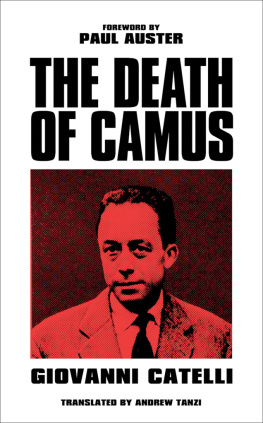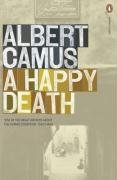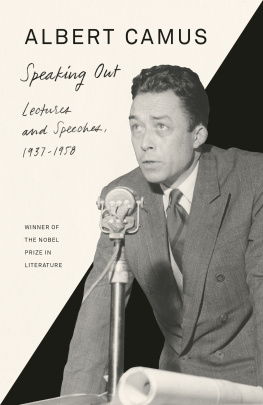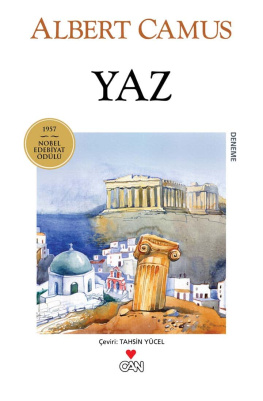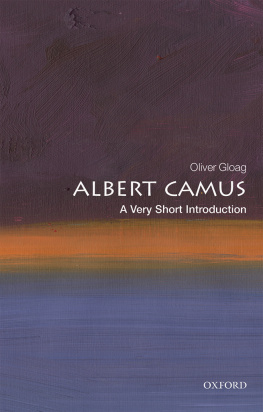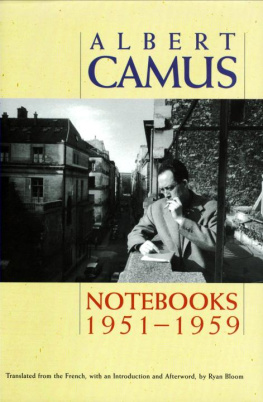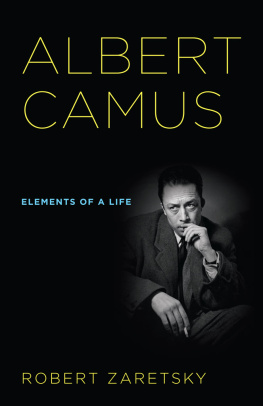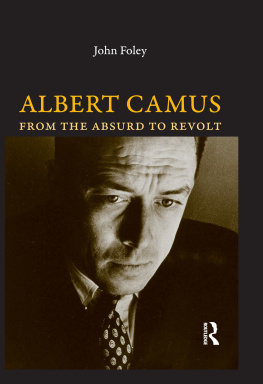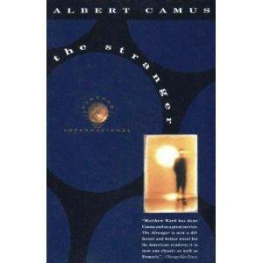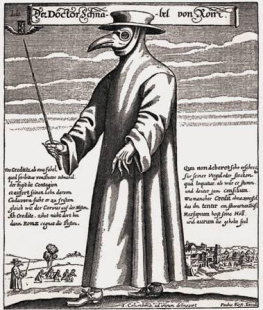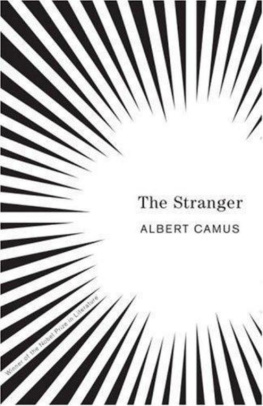Because [Zbrana] was primarily interested in authors who had been persecutedsuch as Babel, Mandelstam, Bunin and Solzhenitsynhe was very thorough when it came to obtaining information about them that was very often not widely available, such as the executions of Babel and Mandelstam, which were hushed up for a long time. For this reason, Ale Kisil [a Czech film-maker who made a documentary about Zbranas life] maintains that Zbrana did his utmost to find credible and objective sources of information in the USSR. Its possibleand actually even probablethat he could have met someone from this circle of people who told him about the assassination of Camus, and who themselves had heard it from someone close to the upper echelons of the Communist Party at that time, Kisil said.
Radio Free Europe/Radio Liberty
The Death of Camus contends that the KGB was responsible for the auto accident that killed Camus [] Perhaps even more controversially, Catelli also argues that the French government was complicit in the killing, with some in the intelligence community believing it necessary in order to improve relations between the two countries.
Inside Hook
Catelli learned not to give up hope in all the time that has passed since he discovered the testimony of Jan Zbrana. His book reads like a detective novel without resolution or punishmentno one was or will be jailed for having murdered Camus but with a compensatory narrative justice.
Pagina 12 (Argentina)
A text of seductive literary, biographical, critical and historical value.
Avvenire
Catelli succeeds in convincing us that Camus could have been assassinated by the KGB.
Le Monde Libertaire
Fast-paced and entertaining, The Death of Camus reads like a spy novel.
La Capital (Argentina)
THE DEATH OF CAMUS
GIOVANNI CATELLI
The Death of Camus
Translated by
Andrew Tanzi

HURST & COMPANY, LONDON
First published in Italian in 2013 as Camus deve morire
2013 Nutrimenti srl.
Via Marco Aurelio 4400184 Rome, Italy
This translation first published in the United Kingdom in 2020 by
C. Hurst & Co. (Publishers) Ltd.,
41 Great Russell Street, London, WC1B 3PL
English translation Andrew Tanzi, 2020
Foreword Paul Auster, 2020
All rights reserved.
Printed in Scotland
The right of Giovanni Catelli to be identified as the author of this publication is asserted by him in accordance with the Copyright, Designs and Patents Act, 1988.
A Cataloguing-in-Publication data record for this book is available from the British Library.
ISBN: 9781787383869
ISBN: 9781787385313 (e-book)
This book is printed using paper from registered sustainable and managed sources.
www.hurstpublishers.com
In memory of Imre Nagy and Salvador Allende

Wreckage from the car crash in which Camus died.
CONTENTS
by Paul Auster
Wrongs that are not righted within a generation simply vanishits as if nothing ever happened. Everything disappearsthe killers and the killed.
Jan Zbrana
The author wishes to thank Marie Zbranov for her support and encouragement, as well as for the documentation provided. He also wishes to thank Herbert Lottman and Marianne Vron Lottman for their friendship, help and precious recollections.
Paul Auster
In this disturbing book, Giovanni Catelli sets out to solve the riddle of the car accident that killed Albert Camus and his publisher, Michel Gallimard, on 4 January, 1960. Based on years of meticulous research, the author builds a compelling argument to support his contention that they were the victims of premeditated murder. A horrible conclusion, but after digesting the evidence Catelli has given us, it becomes difficult not to agree with him. Thus car accident should now be filed in another drawer as political assassinationand thus Albert Camus was silenced when he was forty-six years old.
Albert Camus was a free, indomitable and dangerous man.
He was a threat to all the powers that be, promptly denouncing any abuse, brutality or injustice they committed.
His critical spirit, his inflexible honesty, as well as his unconditional love for mankind and for life enabled him to see beyond the surface of things. He was a threat to those with a dirty conscience among the French and the Algerian rebels, the old collaborationists and Stalinists, the middle-class moralists and high society.
His deathand thus his silencing for goodbenefitted many: the French Nationalists, who were resisting the campaign for an independent Algeria; the Algerian extremists, who recoiled at his moderate stance on the fate of the pieds-noirsFrench Algeriansin the event of Algerian independence; the reactionary forces, who saw him as a champion of the Resistance and the left wing; the Stalinists and the Soviet Union, whom he had bitterly criticised following their brutal attack on Hungary; General Francos fascist dictatorship, which he opposed in his public speeches, seizing every chance to denounce it so that Western countries would deny Spain a place in the international community of nations.
It has always been hard to believe that Camus died as the result of a commonplace car accident. Fate doesnt conspire against a man just like thatthats something men do. And now a crystal-clear clue has emerged from the indistinct flow of time, suggesting a name, an order, a will to kill. Yes, perhaps someone really did decide Albert Camus had to die. Having found that clue, it is our duty to dig deeper so that past events may not be forgotten. Instead, let us ensure that the light of the present, the light of historical investigation shines at last on the naked truth of certain events and, ultimately, let us make it known and understood to future generations.
During our investigation we shall meet real, living protagonistsall characters of great literary and human depth whose paths crossed with Camus often in an unpredictable but always fruitful and sometimes decisive manner.
These protagonists lived in Prague and Moscow. Their names are Jan Zbrana, Marie Zbranov and Boris Pasternak. Prague and Moscowas well as Paris, of coursecan tell us the truth about Albert Camus fate.
Albert Camus died on 4 January 1960. The man who spent his life fighting to defend others from injustice and absurdity perished for no discernible reason. And the apparent cause of his death was what he himself had dubbed the pinnacle of absurdity: a car crash.
Camus was heading to Paris. His publisher and friend Michel Gallimard was at the wheel. They had just had lunch and were cruising along a wide, straight road in broad daylight. Nothing boded ill.
Then, all of a sudden, tragedy struck. Passing motorists said the speeding car was waltzing. It skidded left and right with such violence that the back-seat passengers (the publishers wife and daughter) thought Gallimard was trying to negotiate an unexpected bend. It was as if something was crumbling underneath them. Then the car smashed into one of the trees lining the road, ricocheted against another a few metres further on and was completely destroyed. His skull split open and neck broken, Albert Camus died on the spot.

